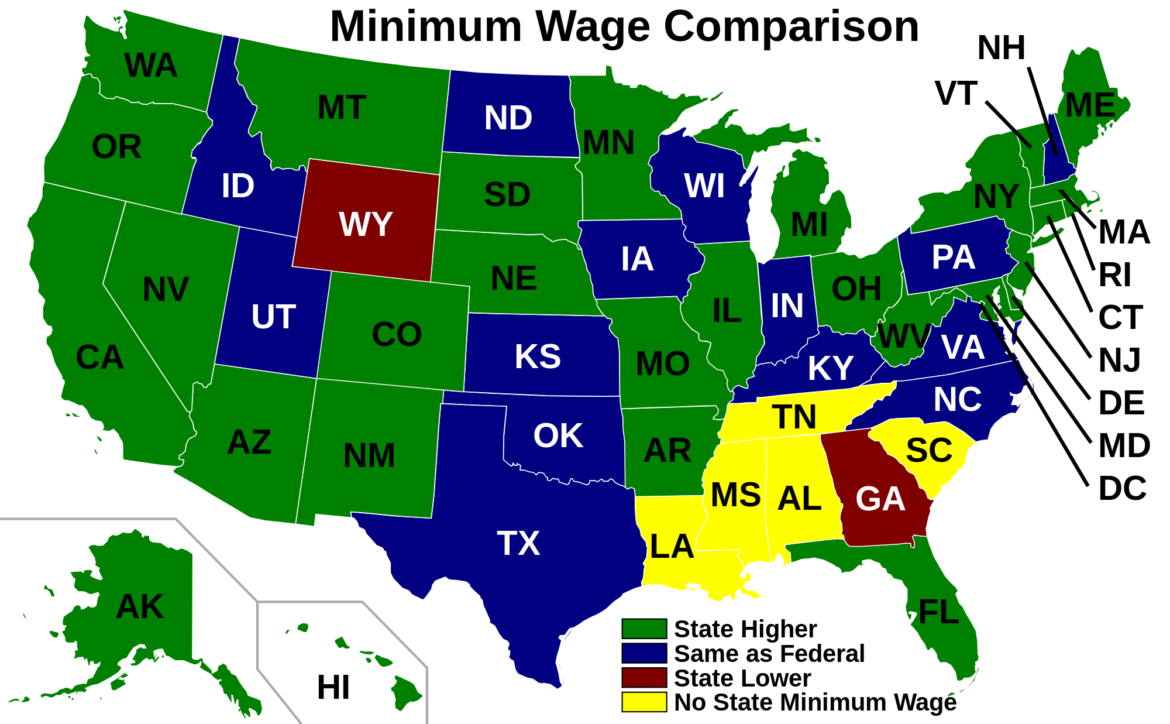Click here for map showing minimum wages by state
By Matt Murray, NH Labor News
A new poll from LendEDU asked small business owners about the impact of the recently passed $15 an hour minimum wage in their state. The poll asked 500 small business owners about how the change would impact their business, would they leave because of it, and overall do they support raising the minimum wage to $15 an hour.
The results were a little surprising.
Overall, 67% of small business owners support the minimum wage increase to $15 an hour. That’s 2/3rds of the small businesses surveyed support a $15 minimum wage while less than 18% oppose it.
Some other intriguing news is that the majority of small business owners believe the increase will have “no impact” or a “positive impact” on their business. This could be due in part to the fact that most small businesses are already paying well over the minimum wage.
In addition, 57% of the small business owners surveyed thought that the increase would be good for their employees including 44% who said it would be good because it would put “more money in their pocket.”
There is still concern about raising the minimum wage. 19% of those surveyed thought the increase would be bad for employees because it would lead to “layoffs” or might lead to “less hours.” However, when questioned about what this increase will mean for their business directly on 3.2% said they would layoff some employees. Most said they would adjust the price of their product to take into account the increase in labor costs.
The Economic Policy Institute just released a new report that shows more than 22 million workers would see a wage increase of, on average $3.10 per hour if the federal minimum wage was increased to $15 per hour. That is a $5,100 a year increase. EPI also determined that an addition 19 million workers would see an increase in wages due to a “spillover effect as employers raise wages of workers making more than $15.”
“Targeting $15 by 2024 is a bold proposal, but it is absolutely necessary—otherwise the minimum wage will never provide a decent wage and overcome the many decades where it rose modestly or not at all.” said EPI President Lawrence Mishel. “Raising the minimum wage to $15 will directly help nearly a third of the workforce, promote robust wage growth, and boost the economy.”
“If we raised it to $15 by 2024, for the first time ever, the minimum wage would no longer be a poverty wage,” said EPI Senior Analyst David Cooper. “Tens of millions of workers, mostly adults who provide more than sixty percent of their family’s income, would benefit from going to $15. This would, in turn, benefit their communities.”
90 % of workers who would get a raise if the minimum wage were increased to $15 in 2014 are age 20 or older. The average worker who would be affected is 36 years old, and 70% are 25 years old or older. The majority of workers work full time, and more than a quarter have children.
Workers of color and women would disproportionately benefit from raising the minimum wage to $15 by 2024, as 40% of black workers and one-third of Hispanic workers would receive a raise. A majority of the workers who would be affected are women (55.6 percent). More than 19 million children—nearly a quarter of all children in the United States—would benefit from an increase in their parents’ pay.






